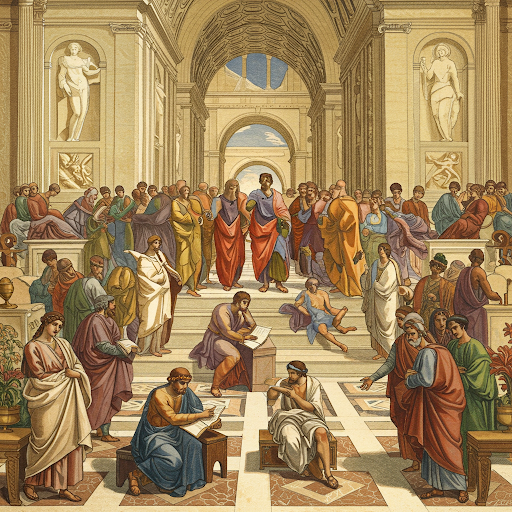Ancient Greek philosophy laid the foundation for Western intellectual traditions, influencing fields ranging from ethics and politics to psychology and self-improvement. Among the most enduring schools of thought, Stoicism and Epicureanism continue to shape contemporary philosophy, personal development, and even modern psychology.
This article explores the core principles of these schools, how they influenced later philosophical movements, and their relevance in today’s world.
1. Stoicism: The Philosophy of Resilience and Virtue
Origins and Core Principles
Stoicism was founded in Athens (3rd century BCE) by Zeno of Citium and later refined by thinkers like Seneca, Epictetus, and Marcus Aurelius. It emphasized:
Virtue as the highest good (wisdom, courage, justice, and temperance)
Control over one’s emotions through reason
Accepting fate with inner peace (Amor Fati)
Distinguishing between what we can and cannot control
Influence on Modern Thought
Cognitive Behavioral Therapy (CBT):
Many techniques in CBT, a leading psychological therapy, stem from Stoic exercises.
Epictetus' idea that "people are disturbed not by things, but by their views of things" mirrors CBT's focus on reframing negative thoughts.
Self-Improvement & Productivity:
Modern self-help books, from Ryan Holiday’s The Daily Stoic to Tim Ferriss’ works, apply Stoic principles for resilience and focus.
Concepts like negative visualization (Premeditatio Malorum) help people prepare for challenges.
Leadership & Business Ethics:
Marcus Aurelius’ Meditations is a favorite among CEOs and military leaders for its practical wisdom on decision-making and leadership under pressure.
2. Epicureanism: The Pursuit of Happiness and Moderation
Origins and Core Principles
Founded by Epicurus (4th century BCE), Epicureanism promoted a life of simple pleasures and intellectual fulfillment. Unlike hedonism, it emphasized:
Ataraxia (tranquility) through moderation
The avoidance of unnecessary desires
The importance of friendship and community
A naturalistic worldview (no fear of gods or death)
Influence on Modern Thought
Secular Humanism & Minimalism:
Epicurus’ rejection of superstition and divine intervention laid the groundwork for secular philosophy and scientific inquiry.
The minimalist lifestyle movement reflects Epicurean ideals of simple living and prioritizing meaningful experiences over material wealth.
Well-Being & Mental Health:
Modern positive psychology, led by figures like Martin Seligman, emphasizes gratitude, meaningful relationships, and mindfulness, mirroring Epicurean thought.
The idea that anxiety often comes from unnecessary desires aligns with modern discussions on consumerism and stress management.
3. The Enduring Legacy of Greek Philosophy
Both Stoicism and Epicureanism continue to offer practical frameworks for modern life, influencing fields such as:
Ethics & Morality: Stoic and Epicurean principles shape modern debates on virtue, happiness, and justice.
Science & Secularism: Epicurus’ naturalism laid the groundwork for scientific reasoning.
Psychology & Self-Help: Stoic practices underpin many modern therapeutic approaches.
Whether in therapy rooms, leadership training, or personal development, these Greek schools of thought remain as relevant today as they were over two millennia ago.









